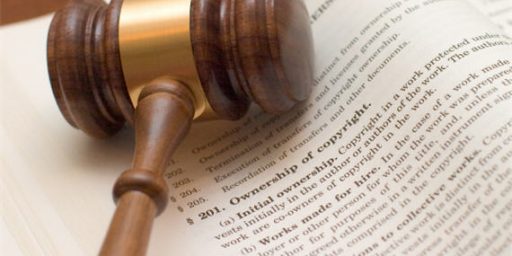Princeton Bans Professors From Giving Journals Copyright
In a shot across the bow of the current publishing model, Princeton is requiring professors to retain rights to their published work so that it may be freely distributed.
In a shot across the bow of the current publishing model, Princeton is requiring professors to retain rights to their published work so that it may be freely distributed.
The Conversation (“Princeton bans academics from handing all copyright to journal publishers“):
Prestigious US academic institution Princeton University has banned researchers from giving the copyright of scholarly articles to journal publishers, except in certain cases where a waiver may be granted.
The new rule is part of an Open Access policy aimed at broadening the reach of their scholarly work and encouraging publishers to adjust standard contracts that commonly require exclusive copyright as a condition of publication.
Universities pay millions of dollars a year for academic journal subscriptions. People without subscriptions, which can cost up to $25,000 a year for some journals or hundreds of dollars for a single issue, are often prevented from reading taxpayer funded research. Individual articles are also commonly locked behind pay walls.
[…]
At a September 19 meeting, Princeton’s Faculty Advisory Committee on Policy adopted a new open access policy that gives the university the “nonexclusive right to make available copies of scholarly articles written by its faculty, unless a professor specifically requests a waiver for particular articles.”
“The University authorizes professors to post copies of their articles on their own web sites or on University web sites, or in other not-for-a-fee venues,” the policy said.
“The main effect of this new policy is to prevent them from giving away alltheir rights when they publish in a journal.”
Under the policy, academic staff will grant to The Trustees of Princeton University “a nonexclusive, irrevocable, worldwide license to exercise any and all copyrights in his or her scholarly articles published in any medium, whether now known or later invented, provided the articles are not sold by the University for a profit, and to authorise others to do the same.”
In cases where the journal refuses to publish their article without the academic handing all copyright to the publisher, the academic can seek a waiver from the open access policy from the University.
The last is, of course, a rather huge loophole. But this is a huge step in the right direction.
Professors often spend months, if not years, producing the articles in question–usually at taxpayer expense. Other professors serve as unpaid (by the journals, anyway) peer reviewers. The journals’ editorial staffs are typically housed in a university department somewhere and unpaid or paid only a modest stipend.
The publishing companies behind the current model contribute essentially nothing to the process, aside from the prestige of an established name. It makes no sense that they’re allowed to hide away the research behind elaborate paywalls.
Given modern technology, I’m not sure why journals in the classic sense continue to exist at all. There’s no need for printing, binding, and distributing physical volumes anymore.It’s not at all clear what would be lost if scholars continued to research and serve as peer reviewers and editors in exactly the manner they do now but then place approved articles online for all to read.







Just possibly because paper has a proven history of lasting longer than any electronic medium to date. Perhaps electronic media can be made to last as long, but we don’t know that yet, beyond theory.
I could, in theory, have nearly all my data in electronic form, but I still prefer paper copies of things like mortgages, tax returns, insurance policies, and the like.
I read an interesting piece on scientific publishing, and the difference in culture between fields of study. In particular, physicists tend to publish on-line first, and share wildly, whereas biologists tend to publish in journals first, and online later. Physicists trust online papers, biologists distrust.
Part of this might have something to do with biotechnology as a business and patent domain. Intellectual property is more closely managed in biology, because it has dollar signs attached.
Anyway, the paper argued that this was going to shake out differently in different fields, and it seemed to make that case.
@John Burgess: I can see that. We try to go paper thin and have scanned most of our important — and not-so-important — documents and have them backed up in multiple places. We generally only keep paper copies of thing like birth and marriage certificates, mortgages, and the like where an “original” comes in handy.
Keep the birth certificates on hand for when you next renew your driver’s license. May want to track down your Social Security card, too. It seems that the states which have signed onto Real ID have significantly upped the ID requirements.
Well, it’s true that electronic media doesn’t last long. Hard drives fail. CDs corrode. Old formats go obsolete.
But all that’s needed for the information encoded on the media to continue to exist is for someone to copy it to another device. So as long as there’s another device and some kind of copying regime (which there probably will be in the form of back-up or archiving) there’s no reason to fear the longevity of digital info.
Unless you don’t want all this copying done in the first place.
LIKE ITS HARVARD MODEL, PRINCETON’S OPEN ACCESS POLICY NEEDS TO ADD AN IMMEDIATE-DEPOSIT REQUIREMENT, WITH NO WAIVER OPTION
http://openaccess.eprints.org/index.php?/archives/844-guid.html
1. First, congratulations to Princeton University (my graduate alma mater!) for adopting an open access mandate: a copyright-reservation policy, adopted by unanimous faculty vote.
2. Princeton is following in the footsteps of Harvard in adopting the copyright-reservation policy pioneered by Stuart Shieber and Peter Suber.
4. I hope that Princeton will now also follow in the footsteps of Harvard by adding an immediate-deposit requirement with no waiver option to its copyright-reservation mandate, as Harvard has done.
5. The Princeton copyright-reservation policy, like the Harvard copyright-reservation policy, can be waived if the author wishes: This is to allow authors to retain the freedom to choose where to publish, even if the journal does not agree to the copyright-reservation.
6. Adding an immediate-deposit clause, with no opt-out waiver option, retains all the properties and benefits of the copyright-reservation policy while ensuring that all articles are nevertheless deposited in the institutional repository upon publication, with no exceptions: Access to the deposited article can be embargoed, but deposit itself cannot; access is a copyright matter, deposit is not.
7. Depositing all articles upon publication, without exception, is crucial to reaching 100% open access with certainty, and as soon as possible; hence it is the right example to set for the many other universities worldwide that are now contemplating emulating Harvard and Princeton by adopting open access policies of their own; copyright reservation alone, with opt-out, is not.
8. The reason it is imperative that the deposit clause must be immediate and without a waiver option is that, without that, both when and whether articles are deposited at all is indeterminate: With the added deposit requirement the policy is a mandate; without it, it is just a gentleman/scholar’s agreement.
[Footnote: Princeton’s open access policy is also unusual in having been adopted before Princeton has created an open access repository for its authors to deposit in: It might be a good idea to create the repository as soon as possible so Princeton authors can get into the habit of practising what they pledge from the outset…]
Stevan Harnad
EnablingOpenScholarship